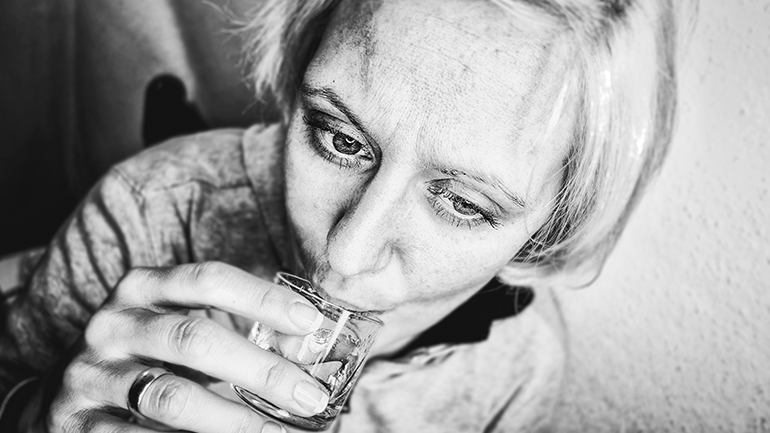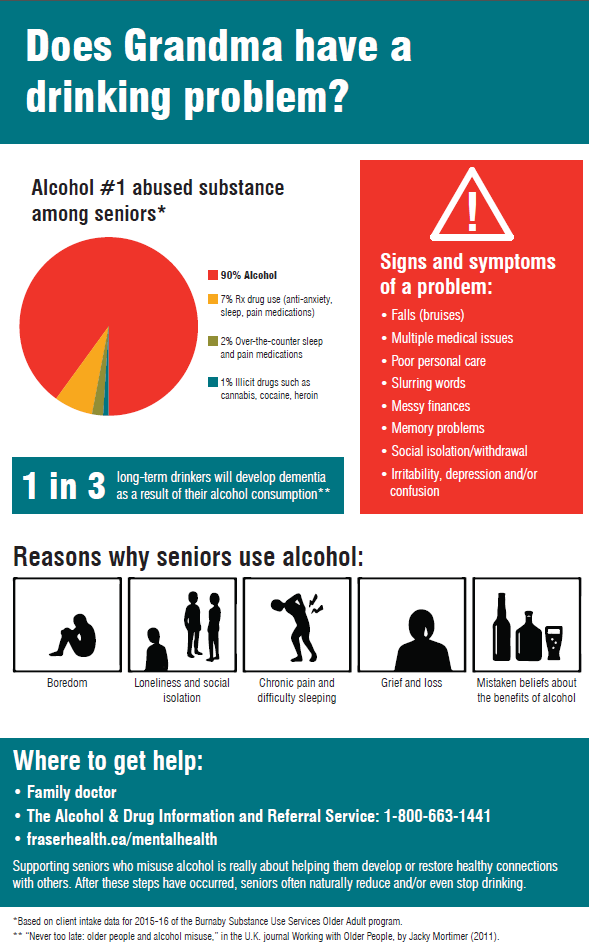
Loneliness, social isolation, chronic pain and difficulty sleeping can cause older adults to misuse alcohol to dull the ache. Here’s how to recognize a drinking problem, how to talk about it, and where to get professional help.
Trish, who is in her early 40s, knew her mother, Marion, had a drinking problem her whole life. It was only recently that she started to ask about her mother’s chronic alcohol use.
“She was a pretty incredible lady…we were extremely lucky to have her as a mother, my brother and I. Our education was always important to her and the drinking didn’t affect her parenting,” recalls Trish.
When Trish and her brother moved out of the house in their 20s, however, Marion’s drinking ramped up, with negative impacts to her health and safety.
“I was drinking quite heavily by then,” says Marion. “Whenever I felt like a drink, I would pour myself a glass of wine and sit down and would keep going until I went to bed.”
Marion had a history of falling, suffering minor scrapes and bruises as a result, but the fall she experienced this past spring was the one that sent her to the hospital and the one that brought to light that she had a problem.
Marion had fallen on the concrete patio of her high rise condo and knocked herself out. Once she regained consciousness, she tried to pull herself up using the patio railing, but couldn’t do it. Eventually, her calls for help alerted the attention of a neighbour, and the paramedics came to take her to the hospital.
“I had been managing quite nicely on my own, or at least I thought I had,” recalls Marion, who retired in July 2015. “I had a history of falling, but I didn’t realize how bad I was getting.
Karla Scribner, a social worker with Fraser Health’s Mental Health and Substance Use services, met with Marion while she was in the hospital. Rather than confront Marion about alcohol being a contributing factor to her falls, Karla suggested she borrow a walker from the Canadian Red Cross health equipment loan program to enable her to get out and about more. She also introduced Marion to supports in her community that could be helpful. “It was like I was given a new lease on life,” says Marion
“Supporting seniors who have problems with alcohol really is about linking them with other seniors’ supports that rarely have anything to do with addiction,” says Steve Giannopoulos, coordinator of Fraser Health’s Burnaby Substance Use Services. “After these steps have occurred, often older adults naturally reduce and/or even stop drinking.”
That’s not to say people won’t relapse, or slip up and have a drink somewhere along the way. In fact, people who are recovering from an alcohol addiction can actually increase their chances of future success by adopting strategies that acknowledge relapse as a part of the recovery process.
“I fell off the wagon in March,” says Marion. “I was bound and determined to have something to drink and, as a very private person, I even shocked myself that I ‘fessed’ up at the next weekly older adult substance use support group meeting I had. I got tremendous support from everyone and it made such a difference.
So much of a difference that Marion now regularly visits the seniors centre in her community, and enjoys exercise classes and outings with friends. “We were in the middle of a phone conversation recently and she cut me off because she had to run; her ride had arrived to take her out to lunch with the ladies,” laughs Trish. “It was just so awesome.”
Alcohol is the drug most commonly used by older adults, directly affecting up to a quarter-million older adults across Canada. The misuse of alcohol and prescription drugs is becoming a serious problem among adults who are entering or who are already in their so-called ‘golden years’.
“Loneliness and isolation are two of the most common underlying issues of a substance misuse problem in older adults,” says Giannopoulos.
While there have been studies that have suggested moderate drinking has protective health benefits such as reducing the risk of heart disease, stroke and diabetes, a new study from the University of Victoria says this previous research has overestimated the health benefits of alcohol
So most experts suggest Grandma’s drinking patterns are worth looking at in case there are signs that it may be impacting her daily functioning.
What's the big deal if Grandma likes to drink?
Some adult children look at their parents’ drinking and see – or are told – that it’s none of their business. They are adults, after all, who have managed this far in life. If that’s the way they want to spend their life, that’s their decision.
But the consequences of failing to address the issue are serious. One-third of long-term drinkers will develop dementia as a direct consequence of their sustained drinking, according to the article “Never too late: older people and alcohol misuse,” in the U.K. journal Working with Older People, by Jacky Mortimer (2011). The misuse of alcohol and prescription drugs can also worsen diseases normally associated with aging, including heart and liver disease, arthritis, diabetes, glaucoma, cataracts, hearing loss, pancreatitis, colitis, ulcers, gastritis and depression (alcohol is a depressant).
Also, sedative-hypnotic medications, such as sleeping pills, Ativan and Valium, and painkillers, create huge risks for falls and other accidents among seniors.
What might cause Grandma to drink to excess?
My go-to stress reliever. An alcohol problem for an older adult can be a long-standing situation, or one that developed recently, says Giannopoulos. For some, drinking has been their way of responding to crises throughout their lives. Old age and its accompanying problems can be like one more crisis to deal with.
My after-work happy hour. Alcohol misuse most commonly occurs among people who developed the habit of pouring a glass of wine or two at the end of the day, without realizing that over the course of a week, it can add up to more than what is medically advised. In fact, a study by the Centre for Addictions Research of BC at the University of Victoria found that Canadians underestimate their alcohol consumption by up to 75 per cent. It’s easy for people to have no idea how much they are actually drinking.
I’m so lonely. Problematic use of alcohol often starts in response to multiple losses: retirement, the death of a partner, or chronic pain can lead individuals to fill the void with alcohol.
No one has time for me. Seniors who have moved to be closer to adult kids and grandchildren are often at risk of abusing alcohol because they are bored and lonely. What may have seemed like a good move doesn’t pan out as they thought it would –their adult kids are busy working and looking after their kids, with less time for their parents. Seniors who have moved into a new community face a lot of ‘unfamiliars’: bank and grocery store staff, the area and climate; even the TV news anchor, may be different, which can compound their feelings of loneliness
I don’t have any friends. Lack of mobility is a significant factor in alcohol misuse. People who are unable to get out and socialize can get depressed. “There are individuals who arrange for taxi drivers to bring them alcohol to their home, and often, it is the only contact they have with the outside world,” says Scribner.
Don’t stop the party. No longer having to ‘be on the clock,’ recently retired adults may lose their attachment to a regular daily structure and continue the celebration long after the retirement party has ended.
All my joints are aching. Seniors may use alcohol and/or other medications to try to cope with chronic physical pain.
How do I decide if there's a problem?
Giannopoulos says he and his team members focus on the drinking’s negative effects on functioning rather than on specific amounts consumed, as different people handle alcohol differently.
“If you have one or two glasses of wine a day and you are unable to care for yourself/your partner; you suffer falls as a result; or it keeps you from enjoying a dinner out with friends, then that is one or two glasses too much.”
What signs or symptoms should I look for in Grandma?
Many of these symptoms can be attributed to other health problems; however, when alcohol use as a contributing factor is reviewed and subsequently reduced/eliminated, these symptoms often disappear.
- Starts ‘cocktail hour’ earlier and earlier
- Neglects personal appearance and is gaining or losing weight
- Falls frequently
- Complains of constant sleeplessness, loss of appetite, or chronic pain
- Seems more depressed or hostile than usual
- Seems to be losing her memory
- Can’t handle routine chores and paperwork without making mistakes
Does age matter?
As we age, our bodies metabolize alcohol more slowly, so drinking two or three beers at age 65 can have the same effect as seven or eight beers consumed at age 20.
Drinking also poses more of a challenge in older adults who have a pre-existing health condition such as diabetes, or kidney or bladder problems, as their organs are already compromised and unable to process alcohol like they once did. Prescription and over-the-counter medications, such as cold medicines, can also amplify the effects of alcohol.
Who's more at risk, Grandma or Granddad?
The Addiction Research Foundation of Canada reports that one in 12 older women has a serious problem with alcohol, although women tend to hide the problem ‘better’ than men. For women the issue of shame is that much greater and women’s bodies cannot handle as much alcohol.
How can I talk to Grandma about her drinking if I suspect a problem?
Normally, when you think of having the difficult-but-important-to-have conversation on alcohol and drugs, your budding teenager comes to mind; not your aging mother. Nevertheless, this conversation needs to be well thought out.
Create an opportunity to bring it up. Conversations with parents can often revolve around the minutia of daily life, like the weather or what happened in a TV show, which can be a way of filling the space where real conversations need to happen. Making gentle observations about her behaviour and then asking if she wants to talk about it can be a way of opening the conversation.
“I live out of town, so I would call at different times during the day to see how she was doing,” says Trish of her mom, Marion. “If I noticed that she was slurring her words or talking silly, I would call her the next day and say something like, ‘It sounded like you were having a good time last night. Do you want to talk about that?’ By taking that open, no-pressure approach, eventually we were able to talk about it.”
Have the right attitude. Being judgmental and/or condescending only causes someone to increase their ‘bad’ behaviour; people who feel badly about themselves often look to drown those bad feelings with more alcohol. Marion commends the way her daughter Trish supported her when she finally admitted to having a problem: “There was no blaming or anything…she just looked at the situation as it was, accepting me for who I was and where I was at, and focused on moving forward. And that worked for me.”
Take her out to socialize. Go for a cup of tea at the local seniors’ centre with her or for a walk-and-shop at a local farmers’ market. Many older adults either have very rusty social skills or have never really socialized while sober, so accompanying them on outings for the first while can help remove the fear factor of meeting new people.
Tackle it from a physical health perspective. Show care and concern and highlight specific examples that concern you, e.g. “You’ve fallen a few times lately/you’re not eating well. I’m worried about you and I’d like you to see the doctor to see if there’s anything physically wrong.”
Don’t talk to her when she is drinking.
Don’t use the term ‘alcoholic’. There is shame associated with this term, which may make her feel badly and less likely to discuss the issue in future.
Don’t talk down to her.Avoid an I-know-what’s-best-for-you approach. Treat her as the adult she is.
Is recovery possible?
With a lot of hard work, recovery is possible, says Steve Giannopoulos.
During recovery, there will be setbacks. Be patient and encouraging with your loved one. What’s important is to acknowledge them and re-focus on moving forward.
Where can I get help for Grandma?
- The Alcohol & Drug Information and Referral Service Lower Mainland: 604-660-9382, B.C.: 1-800-663-1441
- Information, options, support and referrals to a full range of counselling and treatment services across BC. Services are confidential, multilingual, free, and available 24/7
- Visit fraserhealth.ca/mentalhealth
Resource
Alcohol and Aging – BC Ministry of Health
Learn about drinking guidelines and the effects of alcohol consumption and aging.
Related content
This article was originally published in the Healthier You Fall 2016 magazine. Check out the issue here (best viewed in a Google Chrome or Firefox browser).


